How I steward my wealth reveals my spiritual health. (The Dangers of Self-Indulgence)
James 5:1-6
Last week we talked about the importance of humility and how Humility precedes salvation, Humility precedes love, Humility precedes effective prayer, and Humility precedes submission. We come today to James 5, where we’ll hear a stinging indictment upon unrighteous rich people. James has been preaching in the first four chapters but now he assumes the role of prophet. As one commentator puts it, “James’ words are, to be blunt, blunt.”
Listen as I read James 5:1-6: “Come now, you rich, weep and howl for the miseries that are coming upon you. Your riches have rotted and your garments are moth-eaten. Your gold and silver have corroded, and their corrosion will be evidence against you and will eat your flesh like fire. You have laid up treasure in the last days. Behold, the wages of the laborers who mowed your fields, which you kept back by fraud, are crying out against you, and the cries of the harvesters have reached the ears of the Lord of hosts. You have lived on the earth in luxury and in self-indulgence. You have fattened your hearts in a day of slaughter. You have condemned and murdered the righteous person. He does not resist you.”
It’s easy to think this passage doesn’t apply to the majority of us. After all, most of us don’t think of ourselves as wealthy, especially compared to say Bill Gates. But rich is a relative term, isn’t it? According to Gallup, one third of the world’s population lives on less than $2 per day. Compared to them, most all of us all rich. In ancient Israel, there were some really rich people at the top and a whole lot of poor people at the bottom. Those with money often mistreated those who lived on the margins.
Here’s a one-sentence summary of the sermon today: How I steward my wealth reveals my spiritual health.
Have you heard the phrase, “money talks”? I’m reminded of something a comedian said, “If money talks, all it ever says to me is good-bye!”
If money could talk this is what it would say.
- Money can lead to misery. We see this in verse 1: “Come now, you rich, weep and howl for the miseries that are coming upon you.” The phrase, “come now” also appears in James 4:13 and is a call to “listen up and pay attention.”
Some think when James writes to the rich he is referring to non-Christians. That may be the case but there’s certainly application for each of us. He calls them to “weep,” which means, “to burst into tears with wailing and lament.” The word “howl” is an onomatopoetic term like “splash” or “grumble.” The Greek is “o-lo-luzo” meaning, “to shriek and cry aloud.” The Greek literally reads, “Burst into weeping and howl with grief” because they were about to be thrown into the dumpster, or worse
 I wonder if James was thinking of Isaiah 13:6: “Wail, for the day of the LORD is near; as destruction from the Almighty it will come!” We came across a similar idea in James 1:11: “So also will the rich man fade away in the midst of his pursuits.” Proverbs 11:28 says, “Whoever trusts in his riches will fall.”
I wonder if James was thinking of Isaiah 13:6: “Wail, for the day of the LORD is near; as destruction from the Almighty it will come!” We came across a similar idea in James 1:11: “So also will the rich man fade away in the midst of his pursuits.” Proverbs 11:28 says, “Whoever trusts in his riches will fall.”
How I steward my wealth reveals my spiritual health.
- Riches can rot. Check out verse 2 and the first part of verse 3: “Your riches have rotted and your garments are moth-eaten. Your gold and silver have corroded…” In the first century, wealth was measured in three ways: grain, garments and gold.
- Grain has rotted. The rich had so much food it was rotting in their bins. The word “rotted” means, “to putrefy with decay.”
- Garments were moth-eaten. These outer robes were often fancy and flashy and became food for moths. Moths do their destructive work silently and in secret but their damage is almost impossible to repair.
- Gold and silver have corroded. Gold and silver, the most durable forms of wealth, don’t literally rust but they do corrode and tarnish.
James tells the wealthy to prepare to weep and wail, not because they had money but because they had hoarded it. Wealth is not the problem; the misuse of it is. What they owned was useless because it was just piled up in their houses. Plus, they weren’t willing to give what they had to others. It’s like the rich young ruler who walked away instead of giving it away. I’m reminded of what Jesus said in Luke 12:33: “Sell your possessions, and give to the needy. Provide yourselves with moneybags that do not grow old, with a treasure in the heavens that does not fail, where no thief approaches and no moth destroys.”
Let’s be clear. The Bible does not condemn a person for having wealth. Some of the godliest people in the Bible were rich (Joseph, David, Solomon, Barnabas, Philemon, and Lydia). Abraham was wealthy but he maintained his wisdom. When Lot became rich, it ruined his faith and family. It’s OK to have riches in your hand provided they don’t get into your heart. Psalm 62:10: “If riches increase, set not your heart on them.”
James is dealing with our attitudes toward wealth, not the amount we might have. This is brought out in 1 Timothy 6:10: “For the love of money is a root of all kinds of evils. It is through this craving that some have wandered away from the faith and pierced themselves with many pangs.”
One man turned to a buddy at the visitation of a mutual friend who was known to have a lot of money and asked, “How much did he leave?” His friend responded, “He left all of it.”
How I steward my wealth reveals my spiritual health.
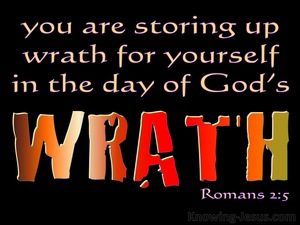 Possessions can possess us. The last part of verse 3 describes how what we own can end up owning us: “will be evidence against you and will eat your flesh like fire. You have laid up treasure in the last days.” The word “evidence” is the idea of proof. Possessions can offer testimony against us and eat away at us. Interestingly, our possessions rust away slowly but they can quickly consume us like fire. Those who store up treasure for themselves will face judgment in the last days. I’m reminded of Romans 2:5: “You are storing up wrath for yourself on the day of wrath.” The question is not, “Do I have money” but “Does money have me?”
Possessions can possess us. The last part of verse 3 describes how what we own can end up owning us: “will be evidence against you and will eat your flesh like fire. You have laid up treasure in the last days.” The word “evidence” is the idea of proof. Possessions can offer testimony against us and eat away at us. Interestingly, our possessions rust away slowly but they can quickly consume us like fire. Those who store up treasure for themselves will face judgment in the last days. I’m reminded of Romans 2:5: “You are storing up wrath for yourself on the day of wrath.” The question is not, “Do I have money” but “Does money have me?”
As a way to guard against this, Jesus urges us in Matthew 6:20-21: “But lay up for yourselves treasures in heaven, where neither moth nor rust destroys and where thieves do not break in and steal. For where your treasure is, there your heart will be also.”
A story is told of a man who was visited by an angel promising to grant him one wish (just work with me…I know this doesn’t happen). The man asked for a copy of the stock market page one year in the future. As he was studying the numbers, he started smiling because he was about to make a lot of money. But then he glanced across the page to the obituaries where he saw his picture. Suddenly his new wealth faded into insignificance in light of his own death.
Since how I steward my wealth reveals my spiritual health, I must remember money can lead to misery, riches can rot, and my possessions can possess me. That leads to the final warning from this passage.
- Self-indulgence can lead to sin. When we are overly focused on our own finances, we can end up ignoring or blatantly wronging other people, especially the poor. Look at verse 4: “Behold, the wages of the laborers who mowed your fields, which you kept back by fraud, are crying out against you, and the cries of the harvesters have reached the ears of the Lord of hosts.” Here’s a case where money is talking loudly! The tense of the verb “kept back” indicates the workers will never get their wages. Their wealth, the withholding of wages, and the workers themselves will all witness against the wealthy.
Landowners were required to pay laborers at the end of every workday (Matthew 20:1-16 tells us more about this). When a worker was not paid, he and his family would go hungry that night. Leviticus 19:13: “You shall not oppress your neighbor or rob him. The wages of a hired worker shall not remain with you all night until the morning.” Deuteronomy 24:15 adds, “You shall give him his wages on the same day, before the sun sets (for he is poor and counts on it), lest he cry against you to the LORD, and you be guilty of sin.” Jeremiah 22:13: “Woe to him who builds his house by unrighteousness, and his upper rooms by injustice, who makes his neighbor serve him for nothing and does not give him his wages.”
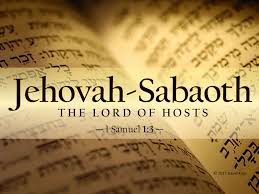 The title “Lord of hosts” is “Jehovah Sabaoth” or “Lord of the Angel Armies,” who acts on behalf of the oppressed. This name refers to the Almighty’s unlimited power to help the poor and deliver the disadvantaged. Jehovah is the self-existent one who is personal, present, powerful, and the ultimate promise-keeper. The word Sabaoth refers to a vast array of angelic warriors.
The title “Lord of hosts” is “Jehovah Sabaoth” or “Lord of the Angel Armies,” who acts on behalf of the oppressed. This name refers to the Almighty’s unlimited power to help the poor and deliver the disadvantaged. Jehovah is the self-existent one who is personal, present, powerful, and the ultimate promise-keeper. The word Sabaoth refers to a vast array of angelic warriors.
The Lord Almighty has all the hosts of heaven ready to do His work. He has unlimited power, unbridled might and untarnished glory. This should give us a pause when ignoring the plight of the poor or mistreating someone living on the margins of life.
The cries against the wealthy go right into the ears of the Lord of Hosts. He also hears the weeping of your wounded heart today. Check out Exodus 3:7: “Then the LORD said, ‘I have surely seen the affliction of my people who are in Egypt and have heard their cry because of their taskmasters. I know their sufferings.’”
God goes to war against the wealthy in order to defend the poor who are being oppressed. Luke 18:7: “And will not God give justice to his elect, who cry to him day and night? Will he delay long over them?”
In contrast to the plight of the poor, James 5:5 says, “You have lived on the earth in luxury and self-indulgence. You have fattened your hearts in a day of slaughter.” The word “luxury” refers to leading a soft life and “self-indulgence” means to “live hedonistically.”
These landowners were living a luxurious life at the expense of their workers. When the wealthy withhold wages, it can result in starvation according to verse 6: “You have condemned and murdered the righteous person. He does not resist you.” This shows the heart of the problem is the problem of the heart.
Not only can wealth decay and our character corrode right now, there’s also judgment to come in the future. The pursuit of pleasure at all costs was only fattening the wealthy for slaughter. Like beasts that eat to their hearts content on the very day they are turned into hamburger, so the self-indulgent are headed to an excruciating end. 1 Timothy 5:6 says: “But she who is self-indulgent is dead even while she lives.” Interestingly, less than 10 years after James was written, the Romans destroyed Jerusalem, wiping out the wealth of all who lived there.
Since how I steward my wealth reveals my spiritual health, I must remember:
- Money can lead to misery
- Riches can rot
- My possessions can possess me
- Self-indulgence can lead to sin
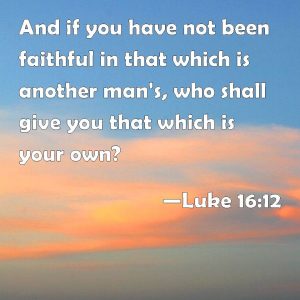 As a way to illustrate these truths, please turn to Luke 16. Jesus tells us we are stewards of all He has given us. We are responsible to manage our time, our talents and our treasures for His glory and the good of His kingdom. Listen to verses 12-13: “And if you have not been faithful in that which is another’s, who will give you that which is your own? No servant can serve two masters, for either he will hate the one and love the other, or he will be devoted to the one and despise the other. You cannot serve God and money.” In verse 14 we see this really got the religious leaders riled up: “The Pharisees, who were lovers of money, heard all these things, and they ridiculed him.”
As a way to illustrate these truths, please turn to Luke 16. Jesus tells us we are stewards of all He has given us. We are responsible to manage our time, our talents and our treasures for His glory and the good of His kingdom. Listen to verses 12-13: “And if you have not been faithful in that which is another’s, who will give you that which is your own? No servant can serve two masters, for either he will hate the one and love the other, or he will be devoted to the one and despise the other. You cannot serve God and money.” In verse 14 we see this really got the religious leaders riled up: “The Pharisees, who were lovers of money, heard all these things, and they ridiculed him.”
Then Jesus tells about a rich man and a beggar to demonstrate how being rich should not be equated with being righteous. In verse 19, we’re introduced to an extremely wealthy man. He lived in a home with a gate to keep others away from him. His clothes were made out of purple, the color normally reserved for royalty. The process to get the purple dye from shellfish was very expensive but this man didn’t care how much it cost. In addition to his beautiful robe his undergarments were made of fine linen, produced from the flax that grew on the banks of the Nile River.
This guy had it all and lived in dazzling splendor every day. While some people are quiet about their wealth, this man strutted around like a peacock. He was self-centered and lived with opulent self-indulgence. He had servants galore, bountiful food, and a gorgeous home. Verse 19 says he “feasted sumptuously every day.”
As this rich guy left in his Tesla to dine in the finest restaurants he drove right past a beggar named Lazarus who sat by his front gate each day. Lazarus was not able to walk so someone had to drop him off every morning. In contrast to the rich man, Lazarus was in need of everything. He had no home, his health was fading, he was an outcast, and he had no food. He longed to eat the rich man’s leftovers, which were thrown in the dumpster after each meal, or even just the crumbs that fell from the table.
While the rich man was clothed in perfumed purple, the poor man gave off a putrid odor. His only companions were the dangerous dogs who ran wild in the streets. These canines were also outcasts but at least they came and licked the oozing sores covering his body. Incidentally, his contact with these dirty dogs made him disqualified from any religious service he might want to attend.
While there was an obvious contrast in how the rich man and the poor man lived their lives, there was also a difference in their deaths. When Lazarus died his misery finally ended, even though he didn’t receive a proper burial or even a memorial service.
When the rich man died he had a fantastic funeral. In that culture, when wealthy people passed away, the family hired mourners, purchased costly spices for the body and used an elaborate tomb for the burial. The whole town turned out for the service and listened to the shrieks and lamentations of the professional weepers and the litany of praise heaped upon the rich man through countless eulogies. He learned too late that “he who dies with the most toys…still dies.”
As soon as Lazarus died, verse 22 says he was “carried by the angels to Abraham’s side.” Abraham is regarded in Scripture as being not only the great patriarch (Hebrews 7:4) but also the father of all believers (Romans 4:11). To be considered a friend of Abraham was the highest honor possible and true happiness would be to spend eternity at his side.
Some translations indicate Lazarus went to “Abraham’s bosom.” In that culture the most honored seat at a banquet would be nearest to the host, reclining in such a way that one’s head was near his chest. The one who had yearned to receive crumbs and scraps is now eating next to Abraham at Heaven’s table.
The rich man went to Hell, or more properly a place called Hades. He was in terrible torment and awful agony. As he looked up he saw Lazarus far away, nestled next to Abraham. The phrase “far off” indicates the unbridgeable gulf between Heaven and Hell. The merciless man now cries out for mercy in a parched voice in verse 24, “Father Abraham, have mercy on me, and send Lazarus to dip the end of his finger in water and cool my tongue, for I am in anguish in this flame.”
What a contrast with how he lived his life! He used to have anything he ever wanted to eat or drink and now he longed for just a drop of water! Incidentally, he knew Lazarus’ name, indicating he knew his plight but had ignored him when they were alive. On top of that, he didn’t seem to mind Lazarus using the dirty end of his finger to put some water on his tongue!
Even though he had been indifferent and apathetic toward Lazarus, now he has no problem treating Lazarus as if he’s his personal servant. How ironic to ask for a favor from the very person who never received a favor from him!
Abraham tells this rich guy to remember how he lived his life. His mind fills with images of poor Lazarus lying by his door with stray dogs gathered around him. He remembers those who tried to tell him about God. He recalls sermons he heard. He remembers those who warned him about the coming judgment. Memories came swimming out of the oblivion. There is no torment greater than an accusing memory. The rich man could not take his money, but he did take his memory.
Then in verse 26, Abraham states it is absolutely impossible for Lazarus to come and help him now: “And besides all this, between us and you a great chasm has been fixed, in order that those who would pass from here to you may not be able, and none may cross from there to us.” There is a fixed boundary between Heaven and Hell. There were many deep impassable chasms in Palestine. The lost and the redeemed are separated forever because the fate of the dead is irreversible. The rich man is still in Hell today and will be there forever.
The rich guy tries one more plea in verses 27-28: “Then I beg you, father, to send him to my father’s house – for I have five brothers – so that he may warn them, lest they also come into this place of torment.” The word “torment” was used of instruments of torture. He didn’t want any company in the tortures of Hell and especially did not want his brothers to join him there. Now he understands the absolute importance of repentance before its too late. He’s hoping if Lazarus could just go back and warn them they would repent.
Abraham tells him his brothers have everything they need. They have their Bibles. They can listen to believers explain the way to Heaven. The rich man doesn’t like this answer because he knows his brothers. He knows they’ve tuned God out and are chasing materialism just like he was. If someone would come back from the dead they would certainly believe and receive salvation. Abraham responds by saying even a resurrection will not convince them because they are not open to spiritual matters.
A recent poll reveals 72% of Americans believe in Heaven while 58% believe in Hell. When asked where they think they will go when they die, 3 out of 4 think they will go to Heaven while only 2% believe they will end up in Hell. The unrighteous rich man was surprised and shocked when he ended up in a place of torture and torment. I’m afraid he won’t be alone.
Let me summarize what we can learn about the afterlife from this passage.
- The dead are still alive. Both Lazarus and the rich man survived their own funerals. When we die, we wake up to spend eternity in either Heaven or Hell.
- Death marks the final separation between the saved and the lost. There’s no second chance when you die.
- Hell is a place of personal suffering. Three times Jesus mentions the torment, suffering, and agony of the rich man. Hell is where God’s wrath is poured out. The Bible speaks of a fire that never burns out, a place where the worm does not die, a place of darkness and gloom where there is continual weeping and gnashing of teeth.
- Those in Hell cry out for help that will never come. Contrary to popular opinion, Hell is not a place of one long party with all of your friends.
The rich man who is still in Hell today knows at least four things:
- Money can’t buy you into Heaven.
- There is no way out for him.
- People can avoid Hell if they repent and receive Jesus Christ as Lord and Savior.
- Someone needs to warn people about the danger they are in.
I should go to Hell because that is where I belong. But, I am going to Heaven because Jesus Christ died on a cross for me and was raised on the third day.
Let me say it clearly. You don’t have to go to Hell. God has provided a way of escape for you. If you ignore Jesus, there is no hope for you. If you do nothing, you’ll end up in Hell. God doesn’t have a Plan B for those who reject his Son.
Application Questions
Here are some questions to ponder.
- In light of what we learned today, do you have eternal life? Are you ready to be saved? Do it now. Don’t delay because you could die today. It’s been said that James never mentions the crucifixion of Christ. Actually, James 5:6 may be a reference to His death: “You have condemned and murdered the righteous person. He does not resist you.” Though Jesus was innocent, He was sentenced to death. He did not resist His accusers. He is the ultimate righteous person who gave His life for the unrighteous.
You could pray something like this…
Lord, I admit I am a sinner and deserve your just judgment. Money has been leading me to misery and I recognize my riches will rot. My possessions have actually possessed me and my self-indulgence is sin. I repent from how I’ve been living and turn to You. I believe Jesus died in my place on the cross and rose again on the third day and now I receive Him into my life. Please save me from my sins and from Your righteous wrath. I want to be born again so I place all my trust in You and You alone. If there’s anything in my life You don’t like, please get rid of it. I pray this in the name of Jesus. Amen.
- Am I hoarding what I think is mine or am I generous with what God has entrusted to me? I like what Randy Alcorn says, “God prospers me not to raise my standard of living but to raise my standard of giving.” God gives to us so we can give to others.
Thanks to everyone who is giving to the Lottie Moon Christmas offering! 100% of it goes to missionaries around the world. I love watching how God uses the generosity of His people to make an impact.
What we keep, we lose. What we give to the Lord, we keep, and He adds interest to it.
- Am I living a fully surrendered life? Have you discovered the joy of serving Him? You’ll never find joy until you first surrender to Him.
- Am I providing help to those who are poor? If the answer is no then come up with some ways you can!
- Am I going with the Gospel to those who are lost in their sins? Sometimes it is as simple as inviting someone to church.
If money talks, what does it say about you?
He had a great house.
She always had the best clothes.
They had the newest car.
They lived like royalty.
Or, is this what your dollars are saying?
He cared about the poor.
They invested in the next generation.
She gave generously.
They gave to support life.
Let’s hold lightly to what we value greatly because much of our stuff will rust and rot and end up in a dumpster. Let go of the things you own because you don’t own them anyway.
Let’s trust the Lord of the Angel Armies! Let’s close in prayer Lord you are the God if infinite power! You have the power to save and change us. We pray you enter our lives in a big way! We pray your will be done in our lives. We thank you for all the many blessings you pour down on us! We pray that you help us be the blessings you will us to be. In Jesus name we pray. AMEN
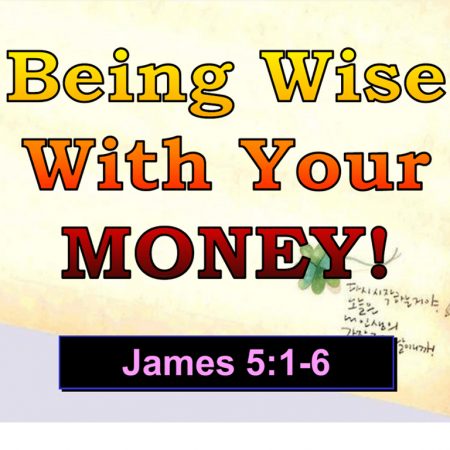

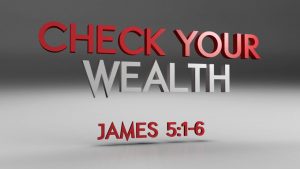
0 Comments